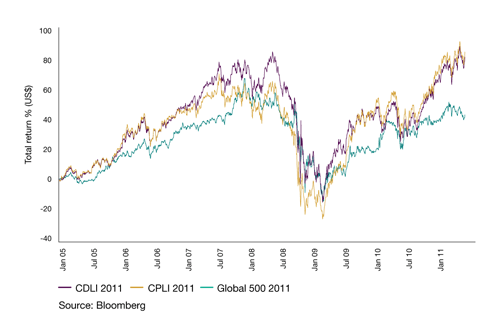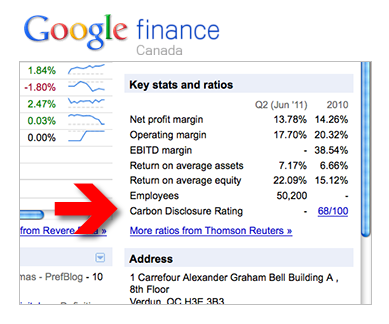 Carbon Disclosure Project releases its Canada 2011 report today at the Toronto Stock Exchange. More Canadian companies than ever publicly report their greenhouse gas emissions. Contrary to the common belief that going green slows growth, businesses who take the lead into a low carbon economy delivered twice the financial return compared to their peers.
Carbon Disclosure Project releases its Canada 2011 report today at the Toronto Stock Exchange. More Canadian companies than ever publicly report their greenhouse gas emissions. Contrary to the common belief that going green slows growth, businesses who take the lead into a low carbon economy delivered twice the financial return compared to their peers.
The director of CDP North America Zoe Tcholak-Antitch leads the launch event with a panel that includes first time CDP reporter Tim Hortons. As a consumer facing business, brand reputation is always the “Big Elephant” in the room, says Tim Faveri, Tim Hortons Director of Sustainability and Responsibility. “Anything that has to do with brand reputation, we must look carefully into it.”
Both the panel discussion and the presentation by Losel Tethong, Canadian Sustainability Lead of Accenture, brought out many interesting points. I have summarized a few notable highlights here.
Businesses who lead in carbon performance delivered twice the financial return compared to their peers. Companies in the Carbon Disclosure Leadership Index (CDLI) and Carbon Performance Leadership Index (CPLI) delivered approximately double the total return of Global 500 companies between January 2005 and May 2011.
Taking action towards low carbon growth is important if business is to protect itself against risks such as resource scarcity and create more sustainable business models that generate long term shareholder value.

More Canadian companies than ever reported their greenhouse gas emissions. Canada’s leading corporations have clearly signalled their willingness to disclose. The highest number of Canadian companies responded to the Investor CDP Information Request in 2011. This represents a response rate of 54%, a significant increase from the 2010 response rate of 46%.
Canadian businesses pursue commercial opportunities through climate innovation. Companies are taking a strategic approach to climate change and are taking action to seize commercial value from its effects.
Canadian businesses generate new revenue from climate change. 54% of respondents indicated they were providing products or services to aid third parties in reducing their GHG emissions.
Canadian businesses build brand value from climate change. Respondents stated that communications about their climate-friendly practices and emission-reducing actions could increase brand value.
Canadian businesses reduce cost and mitigate the risk of rising energy prices. 91 out of the 108 respondents reported a cumulative 425 emission reduction activities that were either underway or completed, demonstrating that companies are planning and implementing energy reduction initiatives to reduce this growing operational expense. Energy efficiency initiatives in operations and building services were among the most popular activities, while transportation-related initiatives were commonly cited. (See case studies on Coca-Cola, Sears, Unilever, Fairmont.)
Climate change has gone beyond compliance, it’s become a business strategy. The majority of Canadian respondents are already integrating climate change into overall business strategy. 75% of the Canadian respondents reported having integrated climate change into their overall business strategies, confirming a commitment to long-term, sustainable growth amidst regulatory uncertainty and the physical effects of a changing climate.
And saving the most interesting point for last …
Google Finance now shows CDP ratings. Environmental, Social and Governance (ESG) data has appeared on the Bloomberg Terminal for a number of years now, forming part of core financial analysis. But recently it has gone even more mainstream. The section “Key stats and ratios” in Google Finance (both Canada and U.S.) now shows a public company’s CDP rating along side traditional indicators like net profit margin, operating margin, etc. It goes to show … carbon is important and investors are watching.

The full CDP Canada 2011 report is available here (PDF).

#cdnpoli Carbon49 – a blog on sustainability for Canadian businesses: CDP Canada 2011: Key Highlights: … http://t.co/6NQFRKdn #cdnprog
CDP Canada 2011: Key Highlights http://t.co/05BBYvTB
@CDSBglobal A few CDP Canada 2011 Report hightlights here http://t.co/FlOvMjop
Great summary Derek, thanks
Green companies deliver 2x financial return compared to peers over 2005 to 2011 #CDP http://t.co/FlOvMjop
Thank you, Laur!
carbon49…… i thing ita a good source to learn about the buisnessses of canada/ thats why i ike it find business in canada </a
Companies in Carbon Disclosure & Performance Leadership Indeces delivered 2xReturn of Global500 companies http://t.co/f5JbB4SC via @Carbon49
[…] means giving up profits and from a fiduciary point of view they are not allowed to do that. Data actually shows the opposite to be true. If you invested in the Global 500 companies in 2005 you […]
[…] by the CDP in 2011 for the period 2005 to 2011, the results were even more dramatic. As I wrote in CDP Canada 2011: Key Highlights, “Businesses who lead in carbon performance delivered twice the financial return compared to […]
[…] by the CDP in 2011 for the period 2005 to 2011, the results were even more dramatic. As I wrote in CDP Canada 2011: Key Highlights, “Businesses who lead in carbon performance delivered twice the financial return compared to […]
[…] means giving up profits and from a fiduciary point of view they are not allowed to do that. Data actually shows the opposite to be true. If you invested in the Global 500 companies in 2005 you […]